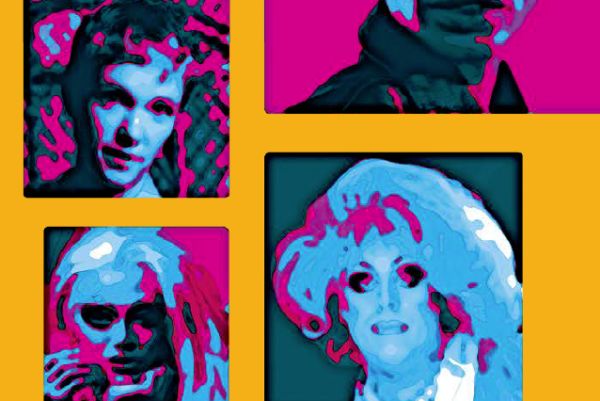Life is absurd but I take it very seriously. With a little help from my friends, I’m working towards authentic living. I have a bodily felt-sense about my being in the world in which I’m alternately comfortable and uneasy. In my rationalisation of my conscious experience, I’ve concluded that happiness is fickle and misery is constant. In the past, I’ve reciprocated the loyalty of my old friend depression in times of adversity, but I still enjoy manic moments of fun and frivolity, which I know won’t last long. Somehow, I remain optimistic about life, despite my growing familiarity with the tragic aspects of human existence.
Mick Cooper once described existential therapy as: ‘…similar to person-centred therapy… only more miserable!’1 He went on to explain that although existentialism is ultimately a philosophy of passion, intensity and care in living, it does seem to have a decidedly melancholic side. From an existential standpoint, life isn’t the fun-filled adventure many of us would like it to be. From an existential perspective, to be human means to have to choose and be responsible. It means facing the limitations of human existence, such as death and uncertainty, and accepting the paradoxes of life. It means striving to find meanings and purposes in a world that may be devoid of them, but in which we’re unable to step off the treadmill of wanting and desiring. To be human means to be caught up in interpersonal misperceptions, entanglements and conflicts that arise from the very essence of our being.1
Cooper also explains that, from an existential standpoint, there is the inevitability and pervasiveness of anxiety. We feel anxious because we have to make choices within a world that’s unpredictable and unforgiving, and where the choice of one thing means the choice against something else. We also feel anxious because we’re aware of the fundamental ‘nothingness’ of our being: that we have no absolute certainty, firm grounding or meaning. As human beings, we’re compelled towards creating stability, definiteness and purposes. But, like building a house on sand, we can’t escape an awareness of how shaky the foundations truly are. Or that one day it will all be swept away.1
Reflecting on my own person-centred approach to practice, I’m inclined to believe in a ‘good life’: that there are a series of stages that we can go through to achieve a more fully functioning state. Similarly, from the CBT perspective, psychological difficulties are a product of distorted and primitive thinking, which have the capacity to be corrected. What an existential perspective adds here is the possibility that our psychological distress, or problem in living, is not a sign of pathology or failure to actualise, but an intelligible and meaningful response to the reality of human existence. We suffer, feel guilt, anxiety and pain, not because we are maladjusted, but because it’s the very essence of human existence to do so. Indeed, existential philosophers such as Heidegger2 believed that the more we experience such distressing feelings as anxiety, the more self-aware, intelligent and actualised we may become.
Implications for practice
Cooper proposes that, from his ‘pluralistic’ standpoint, the key value of this ‘tragic optimism’ may be in helping us to deeply relate to clients who see the world in diverse ways. For those clients who want to ask these existential questions, and who don’t want to be jollied out of their pain, it allows us to sit non-judgmentally with them, and to genuinely and deeply respect what they’re asking and feeling. He compares this to the opportunity to listen to music with an empathic companion. In terms of existential therapy, clients can not only go into their darkest places, but they can go there with someone authentically alongside. For example, I’ve often experienced a sense of both sadness and relief as I’ve listened carefully to clients experiencing loss and bereavement over the years. Accurately tuning in to the music behind the words continues to be a vital work in progress for me.
Existential philosophy suggests that something more may be needed for optimal psychological health: social, political and cultural change. Writers such as Sartre, Camus, de Beauvoir and Merleau-Ponty in post-war France presented existentialism as a deeply politically engaged philosophy, whose adherents manifest a real concern with helping to eliminate the oppressive structures that keep human beings enslaved. Existential thinkers propose that it’s not the primary experiencing of human beings that leads to psychological difficulties. Rather, it’s the distortion, denial or subjugation of those experiences, at secondary level, through social forces.
More recently, Laing argued: ‘We are born into a world where alienation awaits us [and we can become a] shrivelled, desiccated fragment of what a person can be.’3 More than that, we’re then duped into thinking that this crippled, self-restrained state is ‘normality’: the way that we should, and are expected to, be. Hence, not only are we alienated from ourselves, but blind to our own alienation. Normality just is, and to question this ‘collusive madness’ risks stigmatisation and ridicule.3
In this respect, there are many elements of the existential approach that can be seen as radical political acts. Through the process of ‘bracketing’, for instance, clients are encouraged to stand back from and question assumed norms. Indeed, even the most fundamental meanings for why we exist may be challenged. Clients are also encouraged to acknowledge and actualise their freedom. That is, to take responsibility for their acts, and to make their own choices rather than relying on what others say or do.
Cooper warns that those of us with an existential approach may be seen as anarchists within counselling and psychotherapy practice: inviting clients to question the world around them, and to live their lives as they see fit. He suggests a potential criticism of this idea is that it seems to many clients, in his experience, to be more appropriately perceived as a ‘difficult adolescent’s’ view of the world. He suggests that, for many clients, having an anarchist or a stroppy adolescent as their therapist is unlikely to be what they think they need. However, he also proposes that where these radical, counter- normative ideas really come into their own is when working with groups who are, themselves, marginalised or stigmatised by social norms: for instance, clients who are transgendered, immigrants or disabled. Here, as with the ‘social model’ of disability, the focus isn’t on what’s wrong with clients, rather, it’s on clients’ experiences of confronting a world that may oppress, objectify and discriminate against them.
Engaging with clients in such a depathologising way may be experienced as profoundly helpful, validating and empowering. More than this, Cooper suggests, an existential standpoint also invites us to consider social activism as a means towards improved psychological wellbeing: for our clients, ourselves and society as a whole. Therapists may generally consider this outside their remit. But in a world where some clients are clearly and evidently stigmatised, discriminated against and repressed, there may be only so much that individual therapeutic work can do to help such people feel and function better. Instead, for example, laws may need to be changed and stereotypes campaigned against.
One past client, diagnosed as autistic, expressed a profound sense of relief when perceiving my apparent understanding of his unique experience of the world, I reflected to him that our ongoing relationship had often seemed to facilitate his developing ability to interpret and manage previously difficult social interactions in more satisfactory ways. I’d also learned a lot about understanding diverse ways of experiencing life. I thanked him for his help with this personal development project.
Experiencing life
In his introduction to existential practice, Cooper sets out eight distinctive characteristics of how experiencing may be defined in existential terms. These are:1
- Flowing – Experiencing has been defined by Carl Rogers as ‘all that is going on for the person at any given moment which is potentially available to awareness’.4 Experiencing isn’t an object-like entity. Rather, it’s a dynamic flow, continually changing over time. As Eugene Gendlin describes: ‘It is a process, an activity, a functioning, not a bag of static things.’5 For Merleau-Ponty,6 human being is an anonymous flux, which only later comes to be associated with a specific sense of self.
- In the moment – Experiencing has an in-the-moment quality to it: it’s what’s immediately present to us. This might include elements of the past or future, but our experiencing isn’t the past or future, per se, only their resonances in the present.
- Personal – Experiencing has a personal, subjective quality to it: it flows from and to us. So, an actual, external event isn’t what we experience; what we experience is how that event is to us.
- Available to awareness – For something to be experienced, it must be potentially available to awareness. This means that something can be part of our experiential field if we’re not consciously focused on it: for instance, the sound of someone talking behind me. However, something that’s entirely beyond the grasp of our conscious awareness (like the metabolism of fats in my body) cannot.
- Holistic – According to Heidegger, our experiencing is ‘primordially and constantly whole’.2 That is, at any one time, my experiencing is a unified phenomenon rather than a set of independent occurrences.
- Bodily – Experience has a bodily dimension to it. It’s sensory, visceral and affective, a psycho-physiological flow. Merleau-Ponty wrote that ‘consciousness is being towards the thing through the intermediary of the body’.6 For him, the body was like the canvas underlying the picture. That is, not something that can be separated from the mind, but something that always infuses our experiencing.
- Towards something – For Edmund Husserl, perhaps the most fundamental characteristic of experiencing is that it’s intentional: directed towards something outside of itself. ‘Consciousness,’ writes Husserl, ‘is to be conscious of something’.7 In this respect, my experience isn’t inside my head. My experience of this room is out there in the room. This concept of intentionality has important implications if we understand human beings as they are experiencing. It means that, as human beings, our primary dwelling is outside in the space of action constituted by relations to things, plants and animals, other human beings and ourselves. In other words, human beings are not self- enclosed entities, but openings to the world and to others. Heidegger refers to this as ‘being in the world’.2
- Intelligible – From an existential perspective, our experience of life has a quality of intelligibility. Laing proposes that experiencing is always a meaningful and comprehensible response towards the world: ‘there for a reason’, and not something that’s simply irrational, ad hoc or meaningless.3 In The Divided Self and Sanity, Madness and the Family, he argues that even psychosis can be understood in this way: as a sane response to an insane environment.3
Cooper’s succinct presentation of existentialist perceptions about experiencing life has helped me to understand how these complex and diverse ideas apply to my developing therapy and coaching practice.
Authenticity and person-centred practice
Stephen Joseph8 has explored the expanding research base of ‘positive psychology’, and utilised his own research and expertise in recovery from post-traumatic stress, to present a contemporary version of Rogers’ humanistic approach to counselling in Authentic: how to be yourself and why it matters.8 The book is a self-help manual for ‘authentic living’, which elaborates a detailed reflective process, succinctly summarised as: ‘Know yourself. Own yourself. Be yourself.’8
My own developing approach has been inspired by seven years of in-depth counselling work with adult survivors of childhood sexual abuse. I now have a more existential rationale for counselling practice that’s broadly guided by Ernesto Spinelli’s foundation principles for practice: existential relatedness, uncertainty and existential anxiety.9 Joseph’s recent publication caused me to revisit and reflect on the importance of relatedness in my work. His work is founded on the humanistic philosophy of Rogers and Maslow, which some may regard as a limiting Western perspective of human existence. The founding idea of growth towards ‘eudaimonia’ (representing ‘the good life’), however, can be discovered, for example, in the writing of Aristotle, and also seems to be in harmony with other ancient philosophies from different cultures, such as Zen Buddhism and Tao Te Ching. Joseph believes that ‘authenticity’ should be at the heart of everything we do. He suggests that we should replace the current therapeutic ‘quest for happiness’, comprehensively critiqued by Emmy van Deurzen,10 with a quest for authenticity. I sense some personal empathy with his proposition. However, authenticity means many different things to different people, including a diversity of existential thinkers.
Joseph also concludes that authenticity may be a dangerous idea. When people are authentic, they can be awkward, questioning of the status quo, and reluctant to be pawns for someone else. He quotes Noam Chomsky in saying: ‘Every form of authority and domination and hierarchy, every authoritarian structure, has to prove that it’s justified – it has no prior justification... And when you look, most of the time these authority structures have no justification… They’re just there in order to preserve certain structures of power and domination, and the people at the top.’11
Joseph states that authentic people strive to have power over their own lives and so will always ask those who assume power over them to justify it. The more authentic we are, the more we will demand authenticity in our institutions and leaders. These reassuring conclusions have helped me to find my way on my own existentialist path towards personal and professional authenticity.
Christopher Tovey is a counsellor in private practice with 50 years’ experience and professional development in the caring professions, including advanced qualifications in continuing education, social work and psychotherapy. He has been practising person-centred therapy for the last seven years. kenilworthcounselling.co.uk
More from Private Practice

Me and not-me
Open article: Eating disorders challenge the concept of the personal self as single, ongoing, consistent and conscious, writes Lesley Finney. Private Practice, Winter 2017

Harvesting hope
Open article: Christopher Tovey considers the concept of post-traumatic growth in relation to counselling survivors of childhood sexual abuse. Private Practice, Autumn 2017

Record keeping and the law
Open article: Compared with statutory and voluntary counselling agencies, record keeping in private practice presents a number of distinct challenges, writes Peter Jenkins. Private Practice, Summer 2017
References
1. Cooper M. Existential psychotherapy and counselling. London: Sage; 2015.
2. Heidegger M. Being and time. Oxford: Blackwell; 1962.
3. Laing RD. The divided self: an existential study in sanity and madness. Harmondsworth: Penguin; 1965.
4. Rogers CR. A way of being. Boston: Houghton Mifflin; 1980.
5. Gendlin ET. Experiencing and the creation of meaning: a philosophical and psychological approach to the subjective. Evenston, Ill: Northwestern University; 1962.
6. Merleau-Ponty M. The phenomenology of perception. London: Routledge; 1962.
7. Husserl E. Cartesian meditations: an introduction to phenomenology. The Hague: Martinus Nijhoff; 1960.
8. Joseph S. Authentic: how to be yourself and why it matters. London: Piatkus; 2016.
9. Spinelli E. Practising existential therapy: the relational world. London: Sage; 2015.
10. Van Deurzen E. Psychotherapy and the quest for happiness. London: Sage; 2009.
11. Chomsky N. On anarchism. London: Penguin; 2013.
